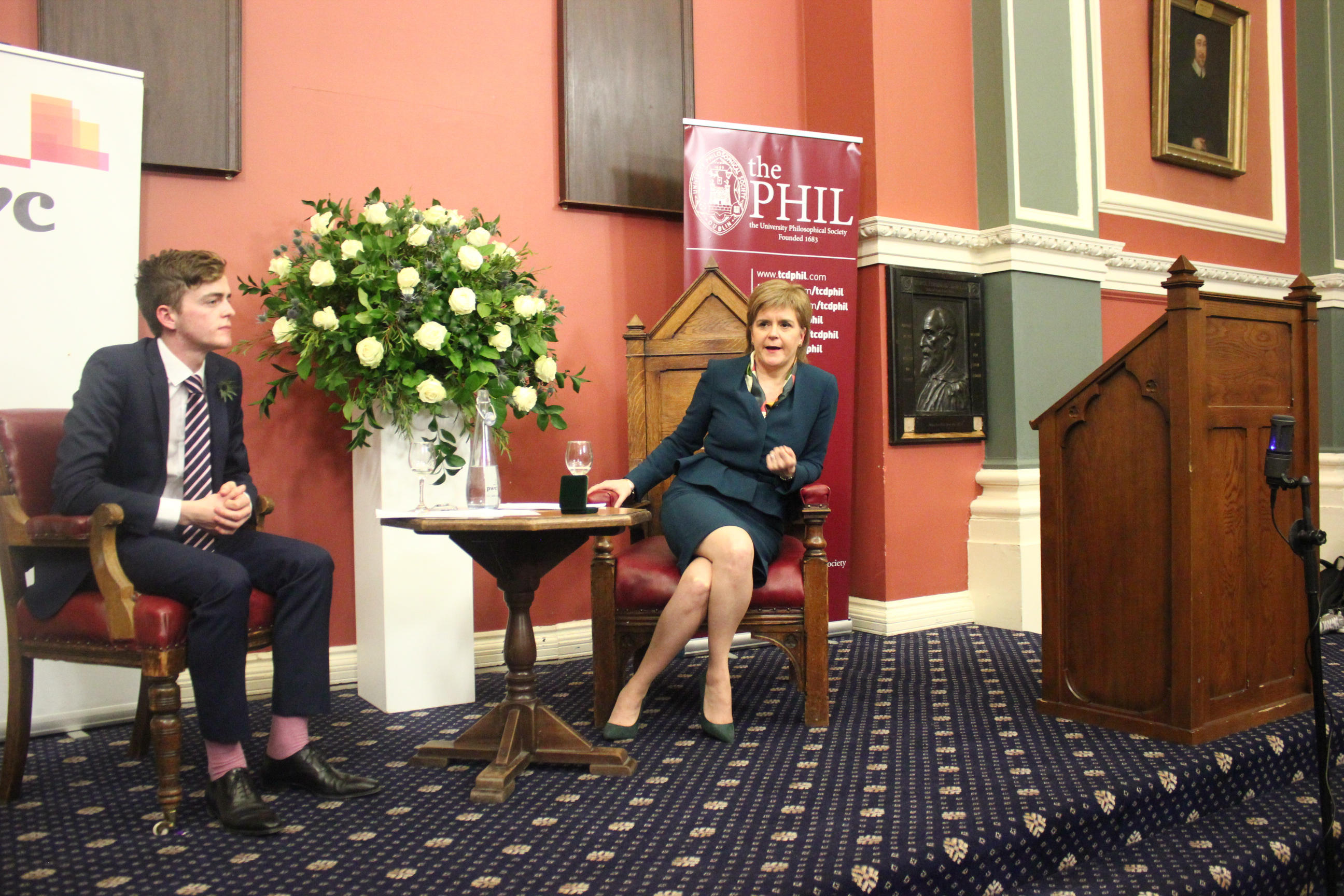The First Minister of Scotland, Nicola Sturgeon visited Trinity College to address the University Philosophical Society, in front of a packed audience of students and staff in the Graduates Memorial Building on Monday, 28 November. She was warmly welcomed to the university by the Provost of Trinity College, Patrick Prendergast. Dr Prendergast stated that the university was “honoured” by Ms Sturgeon’s visit, before going on to speak extensively about the university’s “close links with Scotland”.
Ms Sturgeon received an honorary patronage from the society due to her “excellence in politics and public affairs”. She was presented with the Gold Medal of Patronage by the President of the Philosophical Society, Matthew Nuding, who praised her for being “a principled and compassionate leader” and “an inspiration to young people all over the world”. After receiving her award, Nicola Sturgeon was then accompanied by Dr Prendergast for a tour of the Old Library, where she was shown the Book of Kells. During the tour, Scottish students studying in Trinity and members of the Caledonian Society had the opportunity to meet with Ms Sturgeon in the Long Room of the Library.
Nicola Sturgeon became the first female First Minister of Scotland and leader of the pro-independence Scottish National Party (SNP), following the resignation of her predecessor Alex Salmond in 2014. Sturgeon had previously been heavily involved in the pro-independence “Yes Scotland” campaign, in her role as Deputy First Minister during the historic Scottish Independence Referendum in 2014. Although the pro-independence campaign eventually lost the referendum, Sturgeon’s party, the SNP was able to build on a sense of frustration with “Westminster politics” in Scotland to secure electoral gains. During the UK 2015 General Election, Sturgeon led her party to a stunning landslide victory in Scotland, winning a record 56 out of 59 Scottish seats and over 50% of the popular vote.

Credit: Manus Dennison, University Philosophical Society
This victory was made even more incredible by the fact that the SNP had only won 6 Westminster seats in the previous elections. In May 2016, the SNP under Sturgeon again became the largest party in the Scottish Parliament for a record third term in a row. Apart from campaigning for independence, Sturgeon has been a well-known advocate of social justice and nuclear disarmament. A vocal critic of austerity, Sturgeon has criticised “austerity economics” introduced by the Conservative government in Britain as “morally unjustifiable and economically unsustainable”.
During her address, Nicola Sturgeon spoke of her own modest background growing up in Scotland. Sturgeon stated that if tuition fees had been introduced when she attended the University of Glasgow, she would not have been able to avail of a third level education. She has often said that this is the reason why she opposes tuition fees. The second main point she made during her speech was that politicians should have a respect for facts and logic during debate. She asked the audience “who could forget?” the moment when Brexit campaigner and Conservative MP, Michel Gove, stated that “people in this country have had enough of experts”. Ms Sturgeon stated that “university teaches us to have a respect for facts” and that there have been recent developments in politics that “have a different view of academic excellence”. The last point she made was that we should be able to “disagree in a civil and respectful manner”.
Ms Sturgeon said that while using social media such as Twitter, it’s “very easy to forget we’re all humans”. She shared with the audience the two personal rules that she uses on Twitter; “I never say anything I wouldn’t say on television and I never use Twitter after a glass of wine”. The floor was then opened up to the audience to ask the First Minister questions. Nicola Sturgeon was asked a diverse range of questions, from abortion to the death of Fidel Castro.

Credit: Manus Dennison, University Philosophical Society
The First Minister’s visit to Trinity was just one of many engagements encompassed in her two-day tour of Dublin. On Tuesday morning, she attended a business breakfast organised by the employers group Ibec, with over 120 chief executives present. She then travelled to Leinster House to address the Seanad, becoming the first foreign leader to do so. Ms Sturgeon’s tour also included lunch with President Michael D Higgins in Áras an Uachtaráin and talks with the Minister for Foreign Affairs, Charlie Flanagan.
Her visit culminates a recent meeting with An Taoiseach, Enda Kenny on Friday at the British-Irish Council meeting in Cardiff, where the two leaders both discussed the consequences of Brexit for Ireland and Scotland. Ahead of her visit to Ireland, Nicola Sturgeon issued a statement in Edinburgh outlining the purpose of her trip. There, she stated that “Given the close proximity of our countries, Ireland is a strategic partner for Scotland… I look forward to further developing these areas of common interest to ensure deeper collaboration between our governments to deliver greater economic prosperity for both countries.”







